Iran Askes Hungary To Help Evacuate Nationals From Ukraine
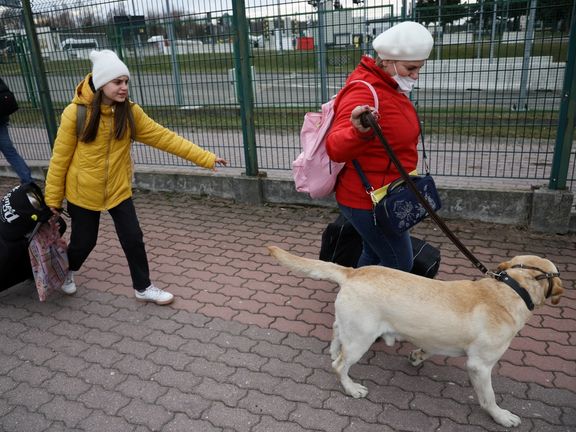
Iran has asked Hungary for humanitarian assistance to facilitate the evacuation of its citizens living in Ukraine through Hungarian territory.

Iran has asked Hungary for humanitarian assistance to facilitate the evacuation of its citizens living in Ukraine through Hungarian territory.
Foreign Minister Hossein Amir-Abdollahian held a telephone conversation with his Hungarian counterpart Péter Szijjártó on Friday about the crisis in Ukraine and how Budapest can help Iranian nationals who want to leave Ukraine.
“Iranian citizens, including students, families of diplomats, and other Iranians living in Ukraine, want to enter the Polish and Hungarian borders to return to Iran,” Amir-Abdollahian said.
According to Szijjártó, Hungary will open a humanitarian corridor for citizens from third-party countries like Iran or India fleeing Ukraine.
It will let them in without visa and take them to the nearest airport, which is Debrecen, Hungary’s second-largest city about 170 kilometers from the Ukrainian border.
Szijjarto also said in a video posted on his Facebook page that cars were queuing for up to 3-5 kilometers on the Ukrainian side at five crossing points.
Iran’s Foreign Ministry said on Thursday that it is trying to obtain necessary permissions for one or more special flights to evacuate Iranians from some parts of Ukraine despite the fact the country’s airspace remains closed because of the Russian invason.
According to estimates, about 5,000 Iranian nationals work or study in Ukraine.
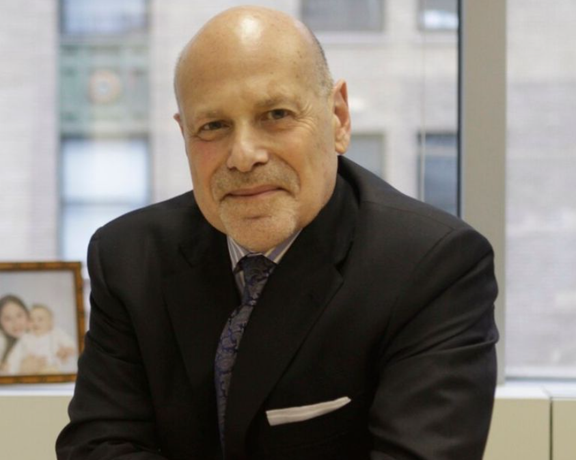
A former hostage in Iran has said that the UN World Tourism Organization is helping the Islamic Republic’s policy of hostage diplomacy by pro-Iran fabrications.
In an article published by the Jerusalem Post on Thursday, Barry Rosen said the United Nations body is a prominent promoter of Iran as safe destination for foreign nationals.
Rosen was taken hostage in Tehran in 1979 after the Islamic Republic was established when militants took over the US embassy in Tehran and seized the diplomatic staff, holding them hostage for 444 days.
He urged the World Tourism Organization (UNWTO) to expose and oppose outright lies and distortions that cast doubt on official warnings against travel to Iran to stop its decades-long hostage diplomacy.
The United Stated, Britain, Canada and many others tell their citizens that tourists in Iran are at tremendous risk of being taken hostage by the regime, but such messages are undermined by the UNWTO and its head, Zurab Pololikashvili, a Georgian diplomat, who is depends on Iran’s support for his job because the regime is a member of the UNWTO Executive Council.
Rosen wrote that the UNWTO held its 40th anniversary conference in Tehran three years ago -- the same city where foreign tourists are held captive, tortured and abused --, when the UN agency announced it is “willing to introduce Iran as a safe and peaceful destination… to attract more and more tourists to Iran”.
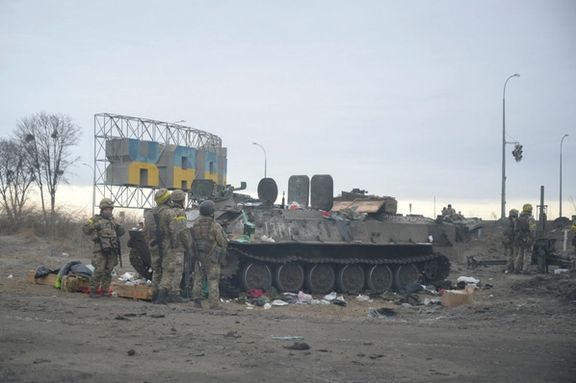
A prominent Iranian politician has expressed cautious optimism that the Russian invasion of Ukraine might speed up a nuclear deal between Tehran and Washington.
Negotiations between Iran and world powers to revive the 2015 nuclear deal, known as JCPOA have unofficially paused in Vienna as Iranian envoy Ali Bagheri-Kani returned to Tehran earlier this week ostensibly for consultations.
Former chairman of Iranian parliament’s national security committee, Heshmatollah Falahatpisheh told Aftab News in Tehran on Friday that “the JCPOA became a victim of the war in Ukraine.” He added, “Although I am pessimistic about the long shadow of the war on JCPOA talks, but I still believe that Putin’s attack on Ukraine might lead to a willingness in the West to bring talks with Iran to a conclusion.”
Falahatpisheh noted two possible reasons for his belief that the Ukraine war might speed up an agreement in Vienna. He argued that the United States and its European allies do not want to see Iran fall further into the Russian orbit. Second, they want to end Russia’s influence in the talks.
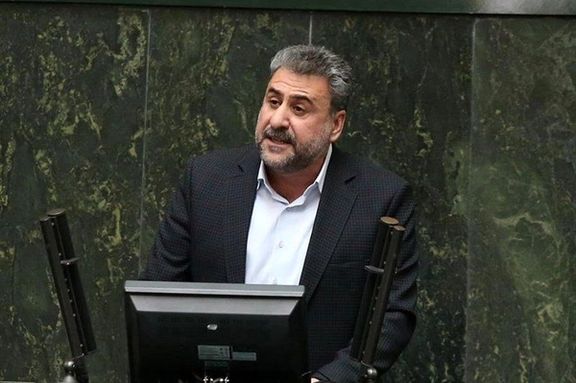
Indeed, Moscow’s chief negotiator Mikhail Ulyanov has assumed an increasingly prominent role in the talks since November, when Iran’s new delegation headed by hardliners resumed the talks in Vienna.
Many in Iranian media have questioned his role as an active mediator, showcasing his photos sitting alone with US chief envoy Robert Malley in hotel conference rooms on several occasions. Even in Tehran’s press controlled by the government, many questioned why Iran does not directly negotiate with the Biden Administration instead of allowing Russia to act as a broker.
In the same vein, some might wonder if Bagheri-Kani’s sudden return to Tehran a few days ago might not have been related to Russia’s impending attack on Ukraine.
There are some questions about what path Tehran will choose after the unmistakable jolt to international relations by Putin’s invasion.
Tehran might now calculate that it does not need an agreement with the West as long as it is able to break US sanctions and export oil, given the global need for fossil fuels amid heavy sanctions on Russia. Shipments have already reached above one million barrels a day, mainly to China. In the meantime, it can continue its uranium enrichment, become a nuclear threshold state, and have more leverage in any future talks.
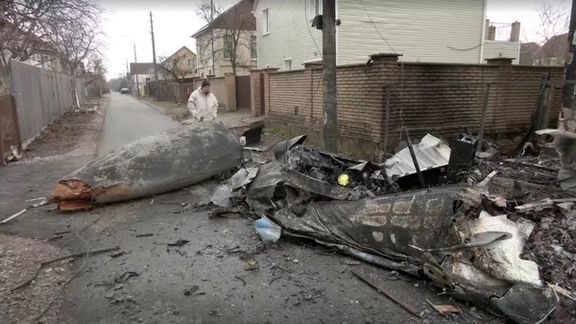
The opposite is also possible, though less likely. Tehran might see Russia as isolated and not useful any longer as a diplomatic backer. It might decide to make concessions to the West now, rather than live with US sanctions, amid an environment of Western unity reminiscent of the Cold War.
But remaining a Russian ally in these circumstances might offer Iran even some military cover and weapons systems, as some sort of a ‘Cold War satellite’ for Moscow.
Falahatpisheh in his interview argued that he has repeatedly expressed his preference for a quick agreement before an external factor derails the nuclear talks. Russia is bound to use every card in its pocket now, including the Iran nuclear issue, he said.
The former senior lawmaker even went as far as indirectly hinting that Moscow has already used its influence in the Vienna talks to detriment of Iran. “Russia knew very well that in case of an agreement in Vienna and the lifting of sanctions, Iran could boost its potential for oil and gas exports to Europe and elsewhere in a short period of time and tried to control the Vienna negotiations.” He added, “If Iran had reached an agreement, now it could sell its oil at above $100 a barrel and regain its global market share.”
Falhatpisheh expressed deep regret that President Ebrahim Raisi and chief negotiator Bagheri-Kani “relinquished the management of the talks to the Russians, paving the way for a suitable environment for the Kremlin to pursue its interests”.
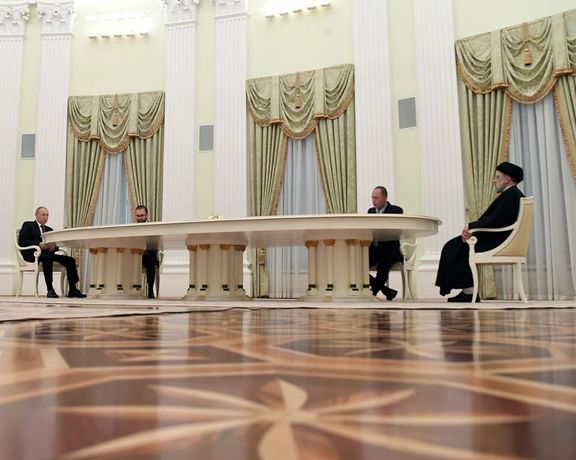
Iranian President Ebrahim Raisi has told Russian President Vladimir Putin in a phone call that NATO's expansion was a "serious threat" to the region's security and stability.
"NATO's expansion eastward creates tension and is a serious threat to the stability and security of independent states in various areas," Raisi was quoted by Iranian media as saying following Russia's military attack on Ukraine on Thursday.
The Iranian foreign minister Hossein Amir-Abdollahian had said earlier that NATO and US are to blame for the Ukraine crisis.
Some in Iranian media and hundreds of social media users criticized the government for statements showing support for Russia in invading Ukraine.
"I hope what is happening will benefit peoples and the entire region," Raisi said as war unfolded and there were reports of dozens of Ukrainian civilians killed by Russian attacks.
Russia is an ally and a diplomatic supporter of the Islamic Republic. The two countries intervened in the Syrian civil war and are believed to be responsible for the deaths of tens of thousands of Syrian civilians.
Russia is also supporting Iran in nuclear talks with the United States as it also plays a mediating role between the Biden Administration and Tehran.

The Russian embassy in Iran has rejected as fake videos published by IRGC-affiliated Tasnim news showing Russian fighter jets in the skies over Ukrainian.
The twitter account of the embassy published a post on Thursday, stating that the videos published by Tasnim with title “Massive presence of the Russian fighter aircrafts and bombers in the Ukrainian sky” is fake and a part of anti-Russian propaganda.
The embassy said that the video is about an aerial parade in Moscow on the occasion of the Victory Day for the Great Patriotic War (1941-1945) and sound is a montage.
It called on the news agency to publish proven information from reliable sources in the future.
Tasnim removed the item from its website and published some other videos showing the explosions and sirens heard in Ukraine.
Tasnim is a website that routinely spreads the propaganda of the Islamic Republic and the IRGC. As the Russian invasion of Ukraine began on Thursday it echoed the official line blaming NATO and US “provocations” for the crisis in Ukraine. The IRGC-linked website apparently published the video to promote pro-Russia propaganda but inadvertently annoyed the Russian embassy.
Earlier in the day, Iran once again reiterated support for Russia in the Ukraine conflict, saying the crisis is rooted in NATO's provocations.
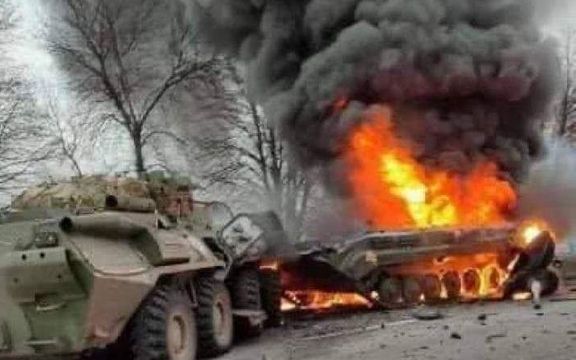
Iran's foreign minister has supported Russia's invasion of Ukraine by casting the blame on NATO and the US, but not everyone in Iran agrees with his position.
"The Ukraine crisis is rooted in NATO's provocations. We don't believe that resorting to war is a solution. Imperative to establish ceasefire and to find a political and democratic resolution," Foreign Minister Hossein Amir-Abdollahian tweeted Thursday.
Mostafa Arani, assistant chief editor of 7Sobh newspaper, in a tweet referred to Amir-Abdollahian's remark saying he avoided mentioning Russia's role in the crisis and only blamed the US and NATO. "Even [Russian Foreign Minister] Sergei Lavrov can't defend Russia as Amir-Abdollahian has done,” he wrote.
Unlike other media outlets, Iran's state broadcaster (IRIB), state-affiliated media such as Fars and Tasnim news agencies, and others associated with hardliners have so far markedly avoided the use of the word "attack" for the Russian invasion. Instead, they refer to the attack as "Russia's special military operations in eastern Ukraine".
The official stance has angered many who find the reporting very biased. Reza Ghobishavi, deputy editor of conservative Asr-e Iran news website, also criticized the media that appear to have sided with Russia and said they had "sacrificed their credibility by siding with Russian President Vladimir Putin".
In a rare incident, Hasan Beheshtipour, a conservative political analyst who often appears on IRIB programs for comments, strongly criticized Russia's invasion of Ukraine and Iran's official stance in a live program. "Invasion whether by the US or Russia is not defensible in any way… Why are you defending Russia? How do you know that Russia will not do the same to Iran some day?" he asked.
"The IRIB is reporting the situation as if it were [the mouthpiece] of a Russian colony," former conservative lawmaker Ali Motahari said in a tweet Thursday.
Motahari also said Iran should condemn the Russian invasion of Ukraine and show its independence. "We must always remember how [Tsarist] Russia took Georgia, Azerbaijan, and Armenia from Iran [in early 19th century] and how the Soviets backed the invasion of Iran by Saddam [Hussein]," he added.
Others have also pointed out Iran's own history with Russia. "We were Russia's neighbors too. They [imposed] the Golestan and Torkmanchay treaties [in the 18th century], occupied Iranian territories during the WWI and WWII, and shelled the Razavi Shrine [in Mashhad]," sociologist Mohammad Fazeli wrote on Twitter. "At least do not give recognition to this military invasion. The logic behind the invasion of Iraq, Afghanistan and Ukraine is the same whether it's by the US or Russia."
Conservative journalist Mohammad Mohajeri in a tweet said he wished his country's foreign minister "had the guts" to condemn Russia's invasion of another country. Mohajeri accused the foreign policy apparatus of lacking "dignity and wisdom" and demanded an explanation of Iran's official stance.
The diplomatic editor of hardliner Tabnak news website, Mostafa Najafi, however, responded to Mohajeri that Iran's condemnation of the invasion would mean taking the West's side. "Why should Iran take the West's side in this matter when it is under their strictest sanctions? It would be best neither to condemn and take the West's side, nor to align ourselves with Russia. What matters is Iran's interests and national security," he argued.
Meanwhile, supporters of former President Mahmoud Ahmadinejad on social media said the current situation is proof of his claim a month ago that Russia and the US had made a "dirty deal" to divide Ukraine and Iran between themselves. "So far half of his prediction proved to be correct," a supporter tweeted.